Life-support can now be withdrawn without court permission, UK judge rules

Legal permission is no longer required before life-supporting treatment is withdrawn from patients with severely debilitating illnesses in a vegetative state, a High Court judge has ruled.
Until now, even if medics and relatives agree to withdraw nutrition from a patient, a judge must also consent. A landmark decision by Justice Jackson means those cases will no longer have to go to court.
As long as doctors and relatives of a patient are in agreement and medical guidelines have been observed, there is no need to bring a lengthy case to obtain judicial authorization, Jackson said.
The case centered on a 50-year-old woman, identified only as ‘M,’ who had Huntington’s disease, a crippling genetic condition for which there is no cure. She is believed to have been in a minimally conscious state in a Midlands hospital and fed through a tube.
She had shown no awareness for 18 months, the court heard.
The tube was removed and she died in August.
The judge’s reasoning is extremely significant, saying there should be no statutory obligation to bring such cases to court. He said even in M’s case – when family and doctors agreed – legal costs reached £30,000 (US$40,500).
“A mandatory litigation requirement may deflect clinicians and families from making true best-interests decisions and in some cases lead to inappropriate treatment continuing by default.”
The judgment is likely to be appealed.
Campaign group Dignity in Dying’s Chief Executive Sarah Wootton, told the Guardian the ruling was a helpful step towards a clearer, more person-centered view of end-of-life care.
“When all parties – the family, the hospital and treating doctors – are agreed on what someone would have wanted for their care, it seems absurd to require a costly court process to confirm this.”
There are believed to be more than 100 patients in England and Wales in permanent vegetative or minimally-conscious states.













